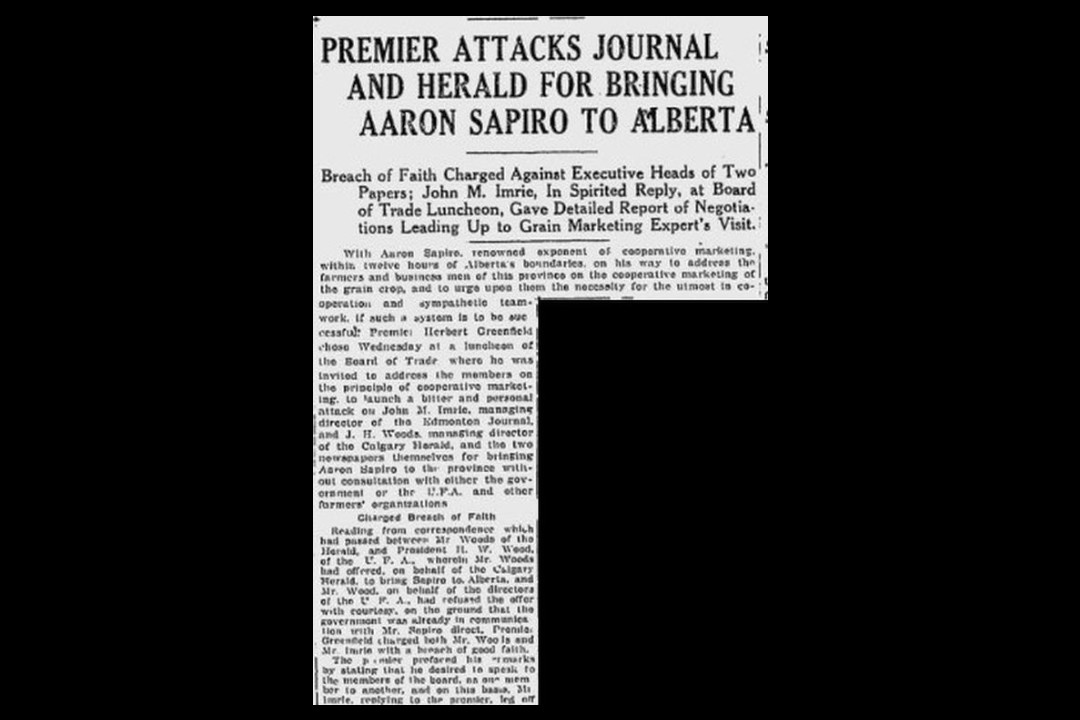On this day in 1923, Alberta's premier was angry at the Edmonton Journal for financing and hosting a speaking tour. But despite the premier's anger, the speaker and their tour would eventually have a massive impact on Alberta's economy.
The 1920s were dire for grain farmers in Alberta. Following the First World War, the federal government established a mandatory wheat board that handled the sale of wheat, helping keep prices stable during the post-war recession. But when that board folded, in 1922, and sales were made to private buyers, grain prices plummeted. Bushels of wheat that were selling at $2.31 in 1919 dropped to 77 cents four years later — less than it cost farmers to grow the grain. With grain farming being Alberta's biggest industry at the time, there was immense pressure on the ruling United Farmers of Alberta party to find a solution.
It was in that environment that the Edmonton Journal and Calgary Herald invited Aaron Sapiro, an American lawyer and labour activist, to provide a speaking tour of the Prairies. Sapiro had already gained a reputation for organizing farmer collectives in the United States. The newspapers invited and paid for him to come to lend support to the movement in Alberta and Saskatchewan. Sapirio spoke in Edmonton, Calgary, Lacombe, and Fort Macleod, as well as five locations in Saskatchewan. His speech was also broadcast on the radio and printed in full in the Calgary Herald. In it, he argued, "there is not a thing dealers do that farmers cannot do if properly organized".
Herbert Greenfield, Alberta's premier at the time, with the UFA, attacked the papers, accusing their executives of a "breach of faith" for hosting the tour. It wasn't that the UFA leadership was against the idea of a cooperative wheat board in Alberta — in fact, members of Greenfield's cabinet had travelled to the U.S. to talk with Sapiro before his speaking tour. But they favoured a more cautious approach than the quick timeline Sapiro encouraged.
Sapiro's speech nonetheless went ahead, and only added fuel to the demands of farmers and the UFA's membership, who wanted a solution before the 1923 harvest. Under this pressure, the government set up the Alberta Wheat Pool — a non-profit collective that farmers could join. Instead of negotiating prices with private grain dealers individually, the collective had more bargaining power, leading to higher prices for members. Alberta's wheat cooperative was the first in Canada, although Sapiro's speeches in Saskatchewan also led to a similar organization in that province shortly after.
As the Alberta Wheat Pool's membership grew, so did its power and influence. By the 1930s, the cooperative — along with its counterparts in Saskatchewan and Manitoba — had become some of the biggest businesses in Canada and held considerable of political power. The group also changed the very landscape of the province, erecting hundreds of grain elevators featuring their logo, a wheat kernel that become iconic for rural Alberta.
The Alberta Wheat Pool remained a force in the province's economy and politics for nearly 80 years. In 1998, it merged with the Manitoba wheat pool to form a new cooperative — Agricore. A few years later, it merged again and dropped its status as a cooperative, becoming a publicly traded company.
Sapiro's speaking series was a catalyst for it all. And while agriculture might not dominate Alberta's economy like the 1920s, it's still a massive industry. Today, farmers continue to face price uncertainty, now from the effects of a changing climate on their crops, and the tariff chaos with the U.S.
This clipping was found on Vintage Edmonton, a daily look at Edmonton's history from armchair archivist Rev Recluse of Vintage Edmonton.

